Spoon Butter Recipe
A spoon butter that doesn't use mineral oil as an ingredient. It will keep your cutting boards, wooden spoons, and wood-handled knives in good shape.
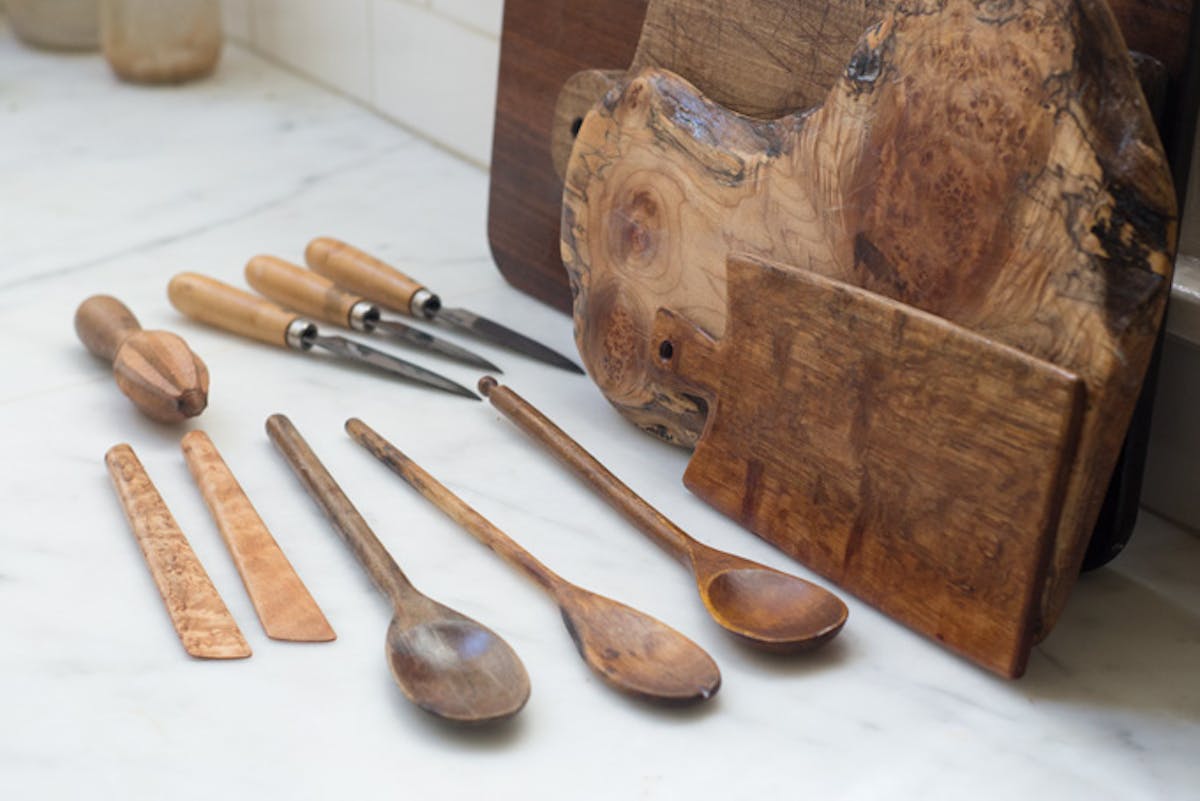
I have a good number of wood cutting boards, wood-handled knives, and wooden spoons in my kitchen, as I'm sure most of you do. One of the things that bothers me most about caring for them is nearly all the products related to this task are mineral oil based. For example, spoon butter. It's typically a blend of beeswax and mineral oil. You rub it into cutting boards and spoons to moisturize them, prevent cracking, and repel water. The wood soaks it up beautifully. I've been thinking, for years, that there must be an alternative to the mineral oil based spoon butter. It's a by-product of petroleum production, and not something I want to ingest.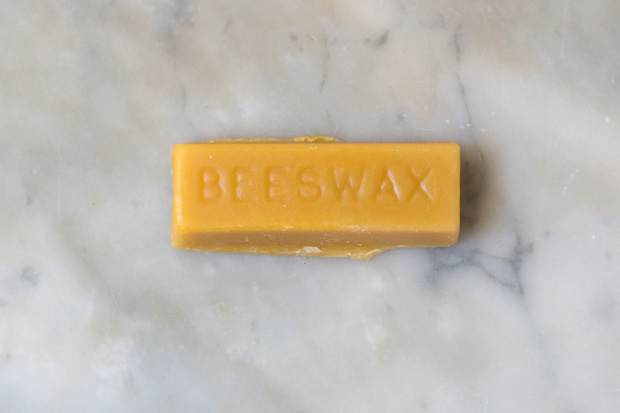
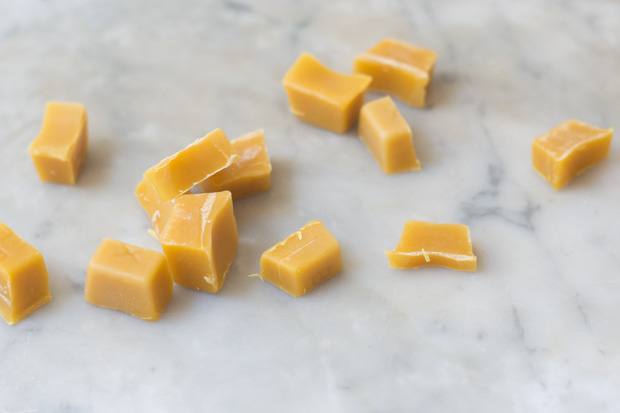
Spoon Butter: Thinking Through an Alternative
So, the way spoon butter works is quite simple. You rub it all over your wood-based spoons, handles, tools, and food preparation surfaces as a moisturizer and conditioner of sorts. Figuring out an alternative solution is a bit tricky. You need something to cut the beeswax, which is solid, snappy, and dense. Mineral oil brings a fluidity to the blend, and it allows you to slather. Swapping in another oil is the logical thing to do, but it's not that simple because a lot of those oils go rancid quickly. Lately, I've been making a spoon butter with a blend of organic beeswax and extra-virgin coconut oil, and I like it! The coconut oil is quite stable, and won't go bad quickly, and the wood laps it up. A coconut scent lingers, just a hint - actually quite nice.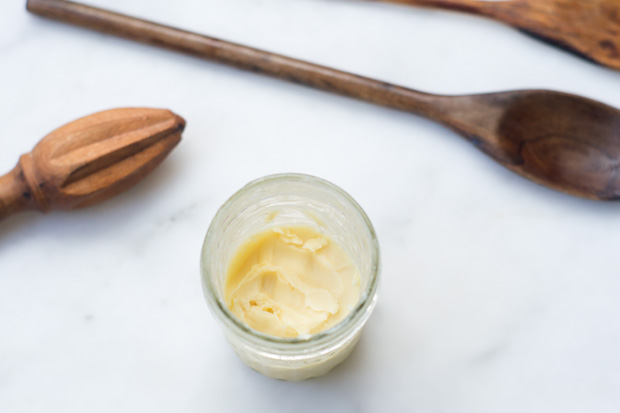
Buying Beeswax
You can typically buy beeswax in bars, or little pearls. The pearls are great because they melt quickly. The bars (above) are rough to cut. I typically cut partially through, and then snap a break on the cut line. That seems to be easiest.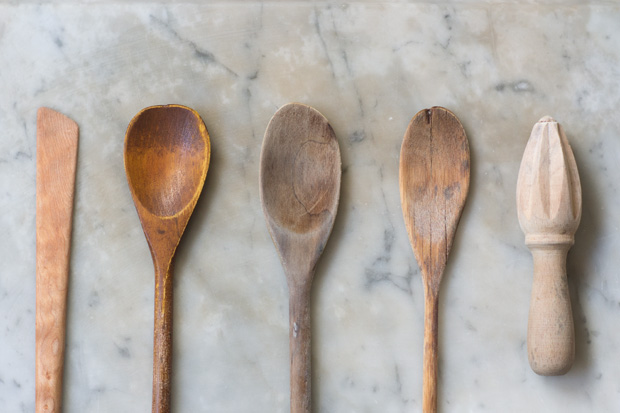
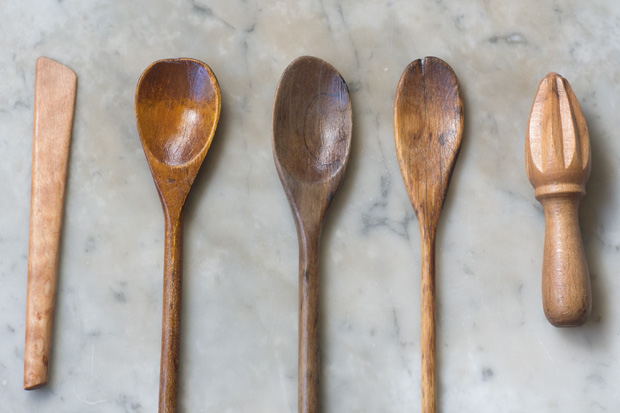
Spoon Butter: Before & After
Here's the before and after - parched spoons on top. And then below, just a few minutes later, after applying the spoon butter. Because, like beeswax, coconut oil is solid at room temperature, getting the ratio of oil to beeswax right is important. If you have too much beeswax, it's impossible to get the spoon butter out of the jar. Coconut oil melts at 76F degrees, so with a high ratio of it, you scoop a chunk onto the surface your working on, and it quickly becomes spreadable.
Alternative Ideas: Let me know if you have other ideas on this topic - I'm all ears. A friend, who makes beautiful all-natural body products recommended I try broccoli seed oil. And as I was poking around, I noticed watermelon seed oil as well. Also, a number of people in the comments have enthusiastic suggestions, including a number for walnut oil. In the meantime, I'm pretty happy with this version & hope some of you give it a try! xo -h
Spoon Butter
I've found, roughly speaking, that a ratio of one part beeswax to ~three parts extra virgin coconut oil makes a nice, spreadable spoon butter.
- 3.5 ounces / 100 grams extra virgin coconut oil
- ~1 ounce / 35 grams beeswax, cut into small chunks
-
To make the spoon butter: Place the coconut oil in a mason jar and top with the beeswax. Fill a thick-bottomed saucepan with an inch or so of water, and set over gentle (low-medium) heat. Set the beeswax jar in the water. The water should come up the sides a bit. Allow the water to come barely to a simmer, and allow the mixture to melt, stirring occasionally, until all the beeswax is fluid. Turn off the heat, and allow to set. The oil is hot, so I allow it to cool and set in the pan, instead of moving it at this point. When cool, cover and keep in a dark place until ready to use.
-
To treat cutting boards, wooden spoons, etc: Start by making sure your wood surface is scrubbed very clean and is completely dry. Use your hands (or a cloth) to slather a generous amount of the spoon butter across the wood, working across the entire surface. Let sit over night. You can then use a smooth cloth to buff off all residual oil at this point. You should have a nice, satiny surface, not at all greasy. Reapply any time you sense your wood utensils and boards seem at all dry.

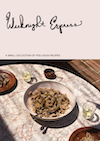
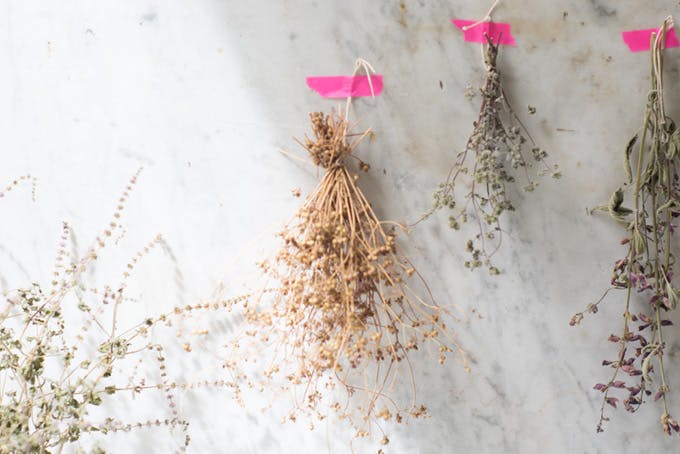
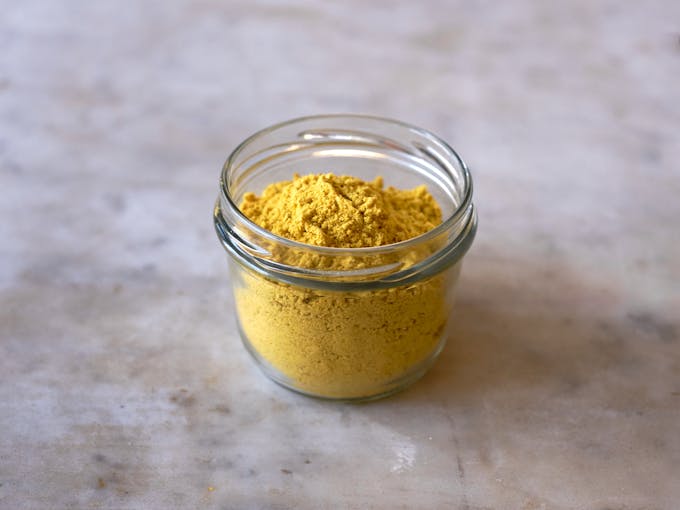
Post Your Comment
Comments
Hi Heidi, I’ve been using sunflower oil to condition my spoons and boards. Would sunflower oil work for this recipe or should I switch to coconut oil? Thanks so much!!!
This is brilliant Heidi, thank you!
Do you ever sand down your spoons and cutting boards before sealing them? I’m thinking of doing this before lathering them up!
Hi Kaly – tbh, I don’t – but maybe should lol.
I’ve been using a beeswax/walnut oil mix for over 10 years with a lot of luck – even if the walnut oil goes “off” a bit, it doesn’t really affect the ability to condition the wood. The only thing to consider is that if you cook regularly for someone who has a tree nut allergy, you have to be mindful. My grandmother is allergic and I have a separate cutting board that I only use when I’m cooking for her. Even though the amount of oil that actually transfers to food is extremely low, her allergy is very severe so I don’t take any chances.
my wooden spoons and cutting boards look great and an unexpected side effect–my chapped hands are soft
Is that a piece of cypress in the photo being used as a cutting board. It is readily available here in AR where I live. Just never thought of using it as a cutting board in my kitchen. My ex bil uses it to make beautiful clocks and tables. So a cutting board would be a breeze for and thanks for the tip on how to care for wood in our kitchens.
I make my own hard lotion bars at home and as I was reading your post, I thought, maybe this stuff would work great on my spoons & cutting boards. It’s totally edible and has beeswax and coconut oil too, with the addition of cocoa butter and shea butter. I actually got the recipe from hardlotion.com. The stuff works wonders on my hands in the dry Minneapolis winters. After slathering the stuff on my hands and driving around in my car, my husband at first complained about the grease I left behind on the leather steering wheel but then noticed that after a while the leather seemed softer and more supple. Talk about multi-purpose: lotion, wood conditioner, and leather conditioner!
The recipe is super easy. You just melt together in a double boiler equal parts beeswax, coconut oil, and butter (half the amount of each butter if you use both shea and cocoa butter), pour the liquid into molds, and cool until hardened. Adjust for climate/temperatures by using more coconut oil and less beeswax for colder regions and vice versa for hotter areas.
Oh – wow – this is a revelation for me Heidi! Your spoons look so beautiful too! I will sneak some beeswax from our backyard beehive! thanks!
Very interesting. I never thought about oiling my spoons, but I probably should. Coconut oil sounds great since it doesn’t go rancid very fast at all.
We learned about hemp seed oil as a great alternative to mineral oil. We use it on our butcher block kitchen island but it never occurred to me to oil or butter my wooden spoons and cutting boards. Must get to that now… Question: does buttering apply to bamboo cutting boards as well?
For those who asked about organic beeswax, Amazon carries “hansiorganics” brand beeswax pastilles.
So curious to know that the first flat wooden tool in the picture is!
This looks great, thanks! I’ve been meaning to get some mineral oil for my butcher block cutting board, but it’s exciting to see that I can use the beeswax and coconut oil already on hand in the kitchen to polish it up!
Thank you so much, Heidi. I have also been wanting an alternative to mineral oil based wood oils.
I make my wood butter with beeswax and walnut oil and have had great luck with this combo.
A woodworker friend of mine recommended walnut oil. It’s a little expensive, but I trust his input. I’ve found that treating my butcher block counter and cutting boards (and book crates in the living room) with just oil leaves the slightest film of grease, even a week later. It also didn’t seal the stain on my book crates (the stain itself was a homemade iron acetate and I’ll never do it again). Does a beeswax combination eliminate the film-y problem?
There is a product called WoodBeams (maybe 2 words, not sure) that I use for keeping knitting needles conditioned. It uses veg oils and essential oils with beeswax if I am not mistaken and is food safe. Also, I think you would be able to grate the beeswax bar in your prep.
What an AMAZING idea. I never really gave a thought about the mineral and now I’m just going to toss it and try this instead. Brilliant!
Brilliant. Finally got me to care for all my wooden kitchen items. PLUS this makes a perfect cuticle cream.
Thank you very much for this idea. We have wooden plates and individual wooden bowls as well as spoons, chopping boards, knife handles, spatulas, spurtle……..I was never very sure what to treat the wood with, so this if very helpful indeed.
I just use olive oil. Everything gets washed often enough that I haven’t had problems with racidity (is that a word?). Anyway my cutting board is olive wood. I think that I saw a german product on another blog though that was food safe (mineral oil is not).
I use a mixture of Beeswax and Walnut oil in a ratio of 1:3 and add a few drops of orange or lemon oil at the end. It soaks in quickly and doesn’t film the surface. My kitchen also has all wooden bench tops that the manufacturers supplied oil just wasn’t protecting and the above mix does beautifully. The drops of citrus oil are a daily joy to smell.
You are right that mineral oil component is a by-product of petroleum production and we should avoid petroleum based products. On the other hand extra-virgin coconut oil is a natural moisturizer, and good for health. Thanks for the tips and instructions!
Thank you for the “recipe” and the discussion, Heidi!
Another natural anti-bacterial as well as odor cleanser is fresh lemon juice. If I’ve chopped onions or cut meat, I will wash the board with a spritz of vinegar and water (my only household cleaning solution) and then squeeze some lemon juice on the board and let it sit a minute before rinsing.
Heidi, you mention using a vinegar spray for disinfecting as do so many of us. White vinegar is also a petroleum derivative – is there any escape? Do you think apple cider vinegar would work as well? Obviously not the organic type.
HS: Sure!
I’m really glad that others are wary of mineral oil – I got badmouthed on a forum a few years ago for saying the same thing. I’ve always used ordinary cooking oil (vegetable, olive or whatever I have handy) on wooden spoons and chopping boards and never had it go rancid, though. I even used it years ago on an untreated beech worksurface.
I have been searching for an alternative to mineral oil for years! I have tried just coconut oil but clearly that is not dense enough to soak into the wood and stay and I found the surface to be constantly oily. You are amazing!
Maybe I am just lucky, but i have been using the same Boone Rock Maple cutting board- the piece of my countertop that was cut out out for my sink- intensely for nearly 30 years without any sealer and it is as tight without the slightest cracking as when I started using it. I sealed the cut edges when I was putting in the countertop- that’s all. I believe sealing is only for looks. Unfortunately, it also works against the anti-bacterial health benefit from cutting on wood vs. plasticis which is a product of de-hydration.
OMG I love you (well I did before too but now even more so)! I too cringe every time I get out the mineral oil for all my wood things. Having just bought a few new wood spoons this is extra fortuitous. Thank you!
I love the dark, rich color of your spoons. Is the color due to the spoon butter? Or were the spoons made from a dark wood? Thanks
I have in the past oiled my boards with olive oil? I had never oiled my spoons or knife handles. Why not I ask myself. Coconut oil would smell amazing.
Thanks for posting this! I have a beautiful butcher block countertop in my kitchen and have been searching for a better solution to care for it! I’ve never treated my wooden spoons, though this post has inspired me to! Great post! Thanks again!
Not only does this sound like a great replacement for the walnut oil I have been using, but jars of it are going to make great little birthday gifts for my best friends, all good cooks. Thanks!
So glad I read this post! (Thanks Maggie!) I’ve been making a mineral oil & beeswax paste for the cutting boards I make, and have never been happy with the idea of using a petroleum based product. Thanks so much for the coconut tip!
As far as disinfecting wood, rubbing a lemon half over any wood surface will get it squeaky clean…BUT a little dry, so you might need some coconut & beeswax paste to apply after!
@Camille Thanks for the walnut oil suggestion. I am highly allergic to coconut so that’s out anyway, but I’d also hesitate to use anything that eventually goes rancid.
I’ll try walnut!
My partner uses a 4:1 ratio of walnut or hazelnut oil to beeswax and it works really well! The hazelnut oil darkens the wood.
i know this might seem like a silly question, but what would be wrong with mixing beeswax and olive oil? i’ve used that to polish my kids’ wooden toys and with the leftovers i just polished my spoons and cutting boards? does olive oil go rancid? i know there is even some you can buy for bowls and such that is just olive oil and beeswax? just curious as in new zealand, coconut oil is super-expensive… and organic is even more so… such that i’d rather eat it than polish anything with it…
OMG you read my mind. I have been researching a replacement to mineral oil since one of the school gardening assignment coming up was mixing mineral oil or linseed oil into sand to clean gardening tools. Last year when I bought the gardening supplies I didn’t think twice, this year after researching what mineral oil actually is (a carcinogen to humans!) I was appalled that the school could use this to clean and prevent tools from rusting in the “organic garden” We have since decided not to do this assignment as replacement oils on-line have suggested even worse–motor oil! Plus bleach to disinfect tools that have been contaminated with disease. I will update my post from last year and thanks for suggesting coconut oil for cutting boards. Thank you!
I am downright abusive to my wooden cooking tools. This makes perfect sense…and yet it hadn’t ever occurred to me. I do, however, oil my soapstone countertops with mineral oil and that has always seemed a bit dubious to me. Maybe I could try this mixture on my countertop?
Because of its high saturated fat content it is slow to oxidize and, thus, resistant to rancidification, lasting up to two years without spoiling. -Wikipedia
Brilliant!
What a creative idea. I am with you, I don’t want to use products on my wooden utensils that I wouldn’t want to ingest. Coconut oil and beeswax seem pretty natural to me!
I recently got a nice cheese board and the instructions said to minimize water exposure. Coating with beeswax offers a great way of minimizing water damage! Thanks for this tip..
Terrific solution, Heidi! Thank you!
This is great, Heidi! My wooden spoons will thank you for this post.
I love this idea!! Thanks so much – I’m going to do this over the weekend
I love all of my wooden spoons and cutting boards in the kitchen – this is exactly what I need to treat them! Thank you!!
Love this idea. We bought a bunch of olive wood in Greece, time for some buttah!
I may make this for Christmas presents!
You can purchase pure coconut oil that does not have the scent or flavor of the coconut. It is done by processing with heat, I think… nothing bad added… I use that for deep frying and a few dainty things you don’t want coconut inside… try it, you’ll like it.
thank you. Very easy, and natural. I will use that for my gardening tools too. Very good end of year present!!
Some of my wooden spoons are looking a little ragged–thanks for the reminder that they can benefit from a little TLC too!
I love this idea! I’ll have to try this on my boards and utensils!
Fantastic idea. I treasure my wooden spoons…
heidi – this is awesome! any idea how long this will last?
I have so many wooden spoons and boardes, so I am happy to use your recipe.
Confession: my wooden utensils go into the dishwasher to disinfect! They do dry out more quickly but I always thought of it as a trade-off for the privilege of cooking with natural wood products!
Heidi, can you recommend a source that charts what the shelf-life of plant-based oils should be? Maybe that would help with the decisions of what oil to mix with the beeswax. And how would one know that the oil used to protect a wooden utensil had gone rancid? Thanks
HS: Not one I believe to be accurate….I think there is a lot of misinformation in this realm cycling around unfortunately. For example, it has been my personal experience that nut oils like hazelnut, walnut, almond go bad quickly – I keep those in my refrigerator in fact! Coconut, seems to keep much, much longer. In fact, I’m not sure I’ve ever had a jar go bad on me….
This is perfectly timed! We just made some wooden kitchen utensils and realized we were all out of beeswax. What we did have left was a mixture of beeswax and coconut oil (made as a dry skin balm) and it worked perfectly! Happy to hear we’re not alone in trying this!! As a recommendation – tung oil. We’ve used it on a few cutting boards before, harder to apply but keeps the wood looking better longer.
i believe coconut oil has some anti-viral / anti-bacterial qualities.
I’d be tempted to eat that butter, it’s so pretty.
Raw linseed oil.Pressed from flax seeds. Not to be confused with boiled linseed, which contains metallic driers. Listed as a food additive by the Food and Drug Administration (FDA). Very long curing time, good looks, low water-resistance, frequent reapplication
Am I the only person in the world who did not know you were supposed to oil your spoons and cutting boards?
Thanks for the enlightenment. I have to go massage my parched spoons now.
This is brilliant–but I’ve always wondered about the beeswax: what is it’s purpose? Sealant? I’ve always just used the mineral oil, and I suppose my not using the beeswax is why my wooden wonders dry out so quickly? Insight? And, do you have a favorite source for the wax?
This is great! I also have a lot of wooden boards and spoons and other utensils and keeping them looking good and in great shape is difficult and like you, I don’t like the mineral oils either. I am going to make this instead. Thanks for sharing a great alternative.
I read about tung oil and walnut oil, they were recommended by a woodworker from Britain.
Where does one buy organic beeswax? Will definitely try this if I can get
it. Always have organic Coconut Oil in the house(get it @TJ’S) great for making popcorn.
Thanks for the tip.
Oh wow. I’m going to seek out beeswax when I’m at the market next.
I agree that it might be better to avoid petroleum products, but using organic oils on wood can be problematic. They go rancid over time in the wood. That’s often why old wooden cooking tools you find at tag sales and resale shops are sort of stinky…
I didn’t even know this was something people did. I honestly never thought about my wooden utensils other than cleaning them. I guess I have some work to do.
Side note: in the photo of the parched vs oiled spoons, what is the ‘spoon’ on the left called? Since seeing one in a photo shoot I have been searching high and low for one of those, but cannot find one because I don’t know what it’s called!!
Thanks!!
Ask your local beekeeper, maybe at the farmers’ market. This is a good time of year to find beeswax.
I use flax seed oil (linseed oil in a food-grade version) which has been used for a long time to preserve wood. It works well. Thanks for the idea with the coconut oil I’ll try that sometimes.
I just saw the lovely wood boards from the first picture at Marshals; I am going back today to buy one !!!!
Heidi, you are the best. Would you believe this topic was keeping me up last night? Then this morning I open my email and there you have it. Thank you!
This is almost exactly how I make hand salves for the winter. Throw in a few drops of essential oil and blend with a cup of luke warm water and you’ll have yourself a lovely body butter.
I was wondering on your thoughts of sanitation with using wood. I was raised in a household where my mother threw everything wood out because it could become unsanitary quickly. Ways of managing this?
Any suggestions for where to order organic beeswax?
@Handful of Shadows…in my kitchen those are called spurtles, although mine have longer handles—the same length as a wooden spoon. My dad makes all my wooden kitchen utensils and I don’t ask too many questions, just hope they keep coming. Good for stirring, scraping, and reaching things on the top shelf 😉
my husband works with wood and regularly uses tung oil which is made from a nut. make sure you get 100% tung oil though – many stores sell it labelled as tung oil but it’s mixed with mineral oil or other oils.
i wonder how tung oil and beeswax would mix? likely with difficulty.
Wait, is a ratio of 100:35 or 100:28? There’s a big difference between the oz and gram values you’ve given here. 1oz is 28g, not 35g.
HS: Hi Michael – I started with 100 g of the coconut oil – ~3.5 ounces. And used 35 g of beeswax. Roughly 1 ounce (technically you’re right, slightly more than an ounce)…any amount in the ballpark of an ounce will get you a decent, (thick) spoon butter.
Forgive my ignorance, but what are the two flat objects in the first pic? I mean the ones that are round at one end and flat at the other. They look like stylized spatulas but are surely too short to be that? Also, those wooden cutting boards in the first picture look too lovely to cut on.
I like to keep the oils as unflavoured as possible so my go to is rice bran, Boring but available everywhere.
I have also heard people using EV avocado oil.
Thank for the tips in cookware care
thanks heidi! this is so useful. i bought an avocado wood cutting board once and the seller explained that walnut oil would be good for treating it. what is your experience with using walnut oil? i think its incredibly expensive and i would rather eat it than rub it over my cutting board.
Thank you thank you thank you…
– my spoons to you!
Great! Could this be used to seal butcher block counters as well?
Thank you for the recipe! If you buy beeswax in bars, you can grate it for quicker melting.
I’ve been oiling my cutting boards but it never occurred to me to oil my spoons. I’ve never heard of spoon butter before but it makes perfect sense, thanks for the tip and instructions!
More Recipes
Weekly recipes and inspirations.
Popular Ingredients